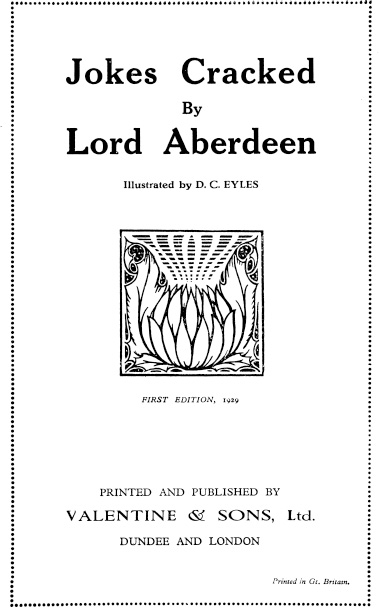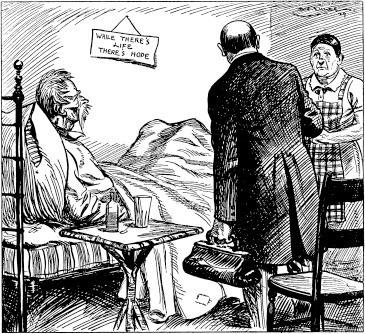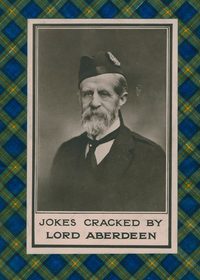
Полная версия
Jokes Cracked By Lord Aberdeen

JOHN CAMPBELL HAMILTON-GORDON
1st Marquess of Aberdeen and Temair, Earl of Aberdeen, KT GCMG GCVO PC
Jokes Cracked by Lord Aberdeen

CONTENTS
Cover
Title Page
Introduction
Foreword
Jokes Cracked by Lord Aberdeen
About the Author
Derek Charles Eyles
The Marquess of Aberdeen and Temair
Did You Know …
Find Out More
Copyright
About the Publisher
INTRODUCTION By John Finnemore
I suspect you have picked up this book for the same reason I did. I may of course be doing you a terrible injustice – it may be that you’re a huge fan of Scotland’s foremost late-Victorian aristocratic comic, and have been counting the days until this chance to revel again in some of his classic gags. However, I suspect that you, like me, picked up this book because the cover made you laugh. And I further suspect that the reason the cover made you laugh was because you couldn’t imagine that his Lordship ever could.
I mean, look at him. That shaggy beard, that granite face, that forage cap. It’s hard to picture the Most Honourable John Hamilton-Gordon, 1st Marquess of Aberdeen and Temair ever even cracking a smile, far less a joke. And it’s that word ‘cracked’, I think, that makes the title so funny. These aren’t just jokes he knew, or even jokes he told … these are the jokes Lord Aberdeen cracked. Immediately, you picture a cavernous banqueting hall, moth-eaten stag’s heads are gazing down at the shivering guests, glumly chewing their tatties … when, suddenly, a strange glassy look comes into the eye of their host. His moustache twitches. His wife, ever-alert to the warning signs, stifles a sob and flees from the room. The guests are not so lucky. With a wag of his finger, Lord Aberdeen alerts his ancient butler, who staggers over to ring the brass bell that has been installed for just this purpose. ‘Pray silence,’ he intones. ‘His Lairdship wishes to crack a joke.’ Lord Aberdeen rises to his feet, clears his throat seven or eight times, and says something like this:
‘A young man had occasion to move from where he had hitherto lived, to another district. He had been associated with Presbyterians in his former abode, but it occurred to the clergyman of the Episcopal Church in the neighbourhood that the young man might suitably be invited to become a member of that Church. This was accomplished; but not long afterwards it transpired that he was about to join the Roman Catholics. On hearing this a friend of the Rector, who, like himself, was a keen curler, remarked, “Man, you’ve souppit him through the Hoose.”’
Yeah? Hello? Is this thing on? Oh, come on! He’d souppit him! Through the Hoose! Because, he had been associated with Presbyterians in his former abode, but now … oh, never mind. Tough crowd.
And, if that’s what you’re hoping for from this book, you will not be disappointed. You will find that joke on page 24, where even the editor at the time has – presumably after staring at it blankly for ten minutes – entitled it ‘For Curlers Only’. And I can’t pretend it’s the only one of his Lordship’s rib-ticklers that is baffling, unfunny, or bafflingly unfunny. ‘The Tandem Story’ is a consummate exercise in taking one very, very slight glimmer of humour, and relentlessly beating it to death; and I don’t even understand the title of ‘Fact-Up To Date’.
Nor is the Marquess’s tone that of a natural comedian. His Lordship is scrupulous about giving credit for his gags where it is due, which is very laudable, but does result in build-ups such as: ‘A reminiscence concerning the late Dr. Campbell, Bishop of Glasgow, which he probably narrated himself, and which at any rate would be thoroughly appreciated by him was …’ I would not recommend this approach should you ever be invited to appear on Live at the Apollo.
Sometimes he goes even further in his desire to set the scene. One story begins: ‘Some years ago at one of the Sir Walter Scott Anniversary Dinners in Edinburgh, I had the advantage of sitting next to Sir Arthur Conon [sic] Doyle. We were both to make speeches later, and perhaps this prompted me to mention …’ He then relates the joke he told Conan Doyle … and that’s it. There’s no record of what Doyle thought of it, or replied – his only role in the story is to sit there, silently enduring Lord Aberdeen’s joke. Perhaps there’s a whole other book to be written there: Jokes Cracked at Sir Arthur Conan Doyle.
So, yes, as you rightly suspected as you gazed into those sad and slightly wonky eyes, you are not in for a laugh riot. But nor is he quite as bad as all that. There are, I submit, funny jokes in this book, if you can look past the natural distancing effect of the language. My second favourite is this one:
A lady remarked to a former Bishop of London on one occasion ‘Oh! Bishop, I want to tell you something very remarkable. An aunt of mine had arranged to make a voyage in a certain steamer, but at the last moment she had to give up the trip; and that steamer was wrecked; wasn’t it a mercy she did not go in it?’
‘Well, but,’ replied the bishop, ‘I don’t know your aunt.’
Now, come on! That’s not bad! And surprisingly cruel. Modernise the language and I reckon you could get a laugh (from a tolerant audience) with that today. Which is pretty good, coming from a late Victorian Governor General of Canada.
My favourite actually made me laugh out loud when I first read it. I mean, not much, we’re not talking breathless paroxysms of mirth here, but definitely audibly. I genuinely like it, especially the punch-line. I feel I should let you come across it in the course of the book, but I will just say it’s the one with the unpromising title ‘A Curious Mistake’. Oddly, it also concerns the death of an aunt. Every comic has a theme that brings out the best in them, and for Lord Aberdeen, it would seem, as for P.G. Wodehouse, it was aunts.
The illustrations in this book are rather nice, as well. I like the Gothic up-lit quality the artist has given to the Bishop/Aunt story mentioned above, and there’s an excellent horse on page 21. I also enjoy the chap who has fallen asleep in church on page 11, and whose beard and moustache are apparently taking the opportunity to scuttle quietly off of his face.
So, look. Like you, I picked up this book to laugh at Lord A, rather than with him. But having read it, and as someone who knows all too well what it’s like to write jokes that aren’t as funny as you hoped they’d be, I find myself oddly protective of the author. I like that he enjoyed cracking jokes; I like that despite being a Marquess and a former Lieutenant Governor of Ireland he didn’t think it was beneath him to publish a book of them, and I quite like, ooh, at least six of his jokes. So, here’s to John Hamilton-Gordon. Long may he have them rolling in the aisles … or at least souppit through the Hoose.
(Speaking of which … in curling, you want to sweep the ice enough to get your team’s stone to the target, or ‘House’, but not so much that it overshoots. Meanwhile, the Presbyterians are an extremely low church denomination of Christianity; Catholicism is of course a very high church; the Episcopalians are somewhere between the two. By encouraging the new arrival to join his church, only to lose him to the Catholics, the Rector has metaphorically swept him through the House … or souppit him through the Hoose! You see! It is funny! It is! Where are you going? Come back! I’ve got a great one about an aunt …)

FOREWORD
In the realm of Wit and Humour, Lord Aberdeen is a name to conjure with. All the kindly geniality of the North comes out in his rich repertoire of stories, and here the Publishers have pleasure in introducing to a wider public a few Gems from his collection.
JOKES CRACKED BY LORD ABERDEEN

ANIMAL FOOD
A certain Scot was not very well, and the doctor was called in. On making enquiries the doctor found that the man was mainly depending on farinaceous food, living, as his wife admitted, on “porridge and milk and whiles brose and tatties,” so he said: “I think your husband should take some animal food; it will brace him up.”
The wife seemed rather dubious, but replied, “Well, I suppose he micht try.”
“All right” said the doctor, “I had better call again in a few days to see how he does.”
And sure enough, in due course, the doctor arrived and on asking the wife how the new diet was suiting her husband, received the following reply:
“Weel, he manages middlin’ well wi’ the neeps; and whiles the linseed cake, but oh! doctor, he canna thole the strae!” (he cannot stand the straw).
LONGING FOR HIS LIVING
In the Scottish Presbyterian Churches there is a plan whereby a minister who, through advancing years, finds the burden of his charge too heavy, can be partly relieved by the appointment of what is known as an “assistant and successor.”
In this way an element of permanence is secured for the assistant or colleague, since, humanly speaking, it is only a matter of time when he will have full charge, and the full stipend, such as it may be.
I remember that the late Dr. Marshall Lang, who was a Moderator of the Church of Scotland, and latterly Principal of the University of Aberdeen, when speaking on a subject which included the above arrangement, said that he had heard of an elderly minister who once said to his “assistant and successor:” “I suppose, my young friend, you are ‘thinking long’ for my dying?”
“Ah, no, sir,” replied the younger man, “you must not put it so; for it is your living that I desire.”
BLIND ON SUNDAY
Dauvid: “I didna see ye, Sandy, at the Kirk on Sabbath.”
Sandy: “I noticed that, when I was takin’ up the collection.”
NO COWARD
A young man arrived unexpectedly at the house of some friends in the country. Could they put him up for the night? Well, they were about full—but, yes, there was one room still vacant, so he could use that. In due course the visitor was conducted to his room, the hostess remarking — “After we had taken the lease of this house we found that one of the rooms was supposed to be haunted; but I daresay you are not superstitious about that sort of thing.” “Oh, well, no,” said the visitor, “I don’t trouble about such tales.” When alone, he surveyed the room. It seemed to him to be rather a gaunt sort of place and somewhat chilly. He began to ruminate as to why such a rumour as he heard should have existed, and he decided that in case there should be any humbug of any sort he would place a small pistol, which he always carried in his dressing-case, by the bedside. Soon he fell asleep; but in the dim, grey light of early morning he awoke, feeling far from comfortable, and soon espied at the foot of the bed the appearance of a hand, in upright position. This seemed uncanny, and after a few moments he reached for his pistol, and then said very deliberately, “Now, I am no coward; but if that hand is not removed when I have counted three, I shall fire-One, two, three—Bang!—Oh!!” And ever since that morning one of the toes of that man’s right foot has been missing.
Конец ознакомительного фрагмента.
Текст предоставлен ООО «ЛитРес».
Прочитайте эту книгу целиком, купив полную легальную версию на ЛитРес.
Безопасно оплатить книгу можно банковской картой Visa, MasterCard, Maestro, со счета мобильного телефона, с платежного терминала, в салоне МТС или Связной, через PayPal, WebMoney, Яндекс.Деньги, QIWI Кошелек, бонусными картами или другим удобным Вам способом.


